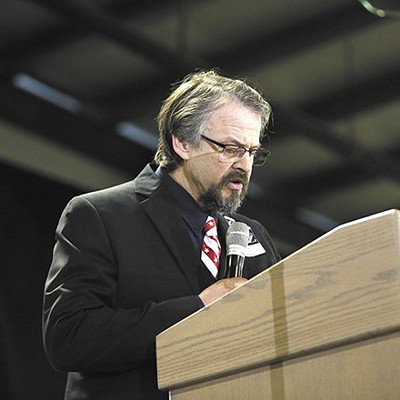Monday, June 6, 2016
Cops can chase drunk drivers from Oregon into Washington, but not vice versa
Had Darin Mercado been driving from Oregon into Washington, he might be staring at a DUI. But because he was driving from Washington into Oregon, the police could not legally pursue him.
According to Oregon law, cops from other states may only cross into Oregon in pursuit of someone "believed to have committed a felony in the other state." Under those circumstances, out-of-state officers have the same authority as any Oregon cop. That means, Washington officers, for example, can't chase you into Oregon on suspicion of drunk driving, which is a misdemeanor in Washington.
Washington law, however, specifically carves out an exception for out-of-state officers to pursue suspected drunk drivers into the state.
(In most cases, a person is subject to the laws of whatever state they are currently in, even if the alleged criminal action or infraction took place in a different state.)
Mercado was driving from Walla Walla to his home in Oregon. Police had gotten calls that he was driving drunk and had gotten into a road rage confrontation.
He was pulled over just across the Oregon border by College Place Police Officer Steven Harris, who was soon joined by three other Washington state cops. Shortly after being stopped, Mercado was tased, cuffed, and put in the back of a police car, which was sitting in Washington.
Mercado sued the four officers from three different Washington state agencies in federal court, alleging they had no authority to follow him into Oregon, arrest him and haul him back to a Washington jail without first seeing an Oregon judge.
"The police have to follow the law the same way we do," says Mercado's attorney Breean Beggs, who adds that the officers violated federal law and the interstate agreement between certain law enforcement agencies in Washington and Oregon by not contacting Oregon authorities. (Beggs is now a Spokane city councilman and has been a major proponent of police accountability and reform.)
"If you want to arrest someone in another state, then you have to follow that state's law, which basically says, 'call that state's law enforcement agencies,' and if you don't
Mercado's case rests on the fact that Harris, the officer who originally stopped Mercado, said he did so because Mercado rolled through a stop sign (as seen on Harris' dashcam) and on suspicion of an assault, which he had not witnessed. Because Harris did not witness the alleged assault, it was impossible for him to distinguish between a felony and misdemeanor level attack. Again, Washington cops can't chase into Oregon, except for suspicion of a felony.
Therefore, Beggs argued, Harris had no right to stop Mercado and everything that happened after that — tasing, handcuffing, transporting back to Walla Walla — was a violation of Mercado's civil rights.
The officers decided to arrest Mercado that night after Harris observed him "slurring his words, stumbling around, and fumbling for his license and his wallet," according to court documents. "Mercado also appeared to be holding himself up on his car, walking in a circle a little bit, and not following directions."
The state trooper, Shawn Williams, said he smelled alcohol on Mercado's breath.
In court documents, and at the scene, Mercado denies that he was drunk. You can watch the dashcam video, and decide for yourself if Mercado appears drunk and stumbling. Harris catches up with Mercado around the 5:20 mark.
So far, the State Patrol and the Walla Walla County Sheriff's Office paid out settlements, but the City of College Place has not.
"They've spent more money than they would have needed to settle the case," Beggs says. "If they lose, they will have spent that money and then they're going to have to pay my lawyer fees and damages for my client."
He adds that
"There's some
The Walla Walla prosecutor has dropped all charges against Mercado.
Tags: Police , Walla Walla Sheriff's Office , Washington State Patrol , College Place Police Department , fresh pursuit , Breean Beggs , DUI , News , Image , Video















